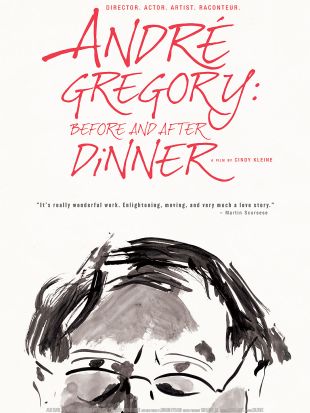Before and After Dinner constitutes a bold, courageous, frequently haunting profile of maverick stage director André Gregory, beautifully conceived and shot by his wife, Cindy Kleine. On the surface, the documentary feels loosely woven and structured in keeping with its multifaceted subject, perhaps recalling one of Jonas Mekas' free-form essay pictures; we get seemingly unrelated topical strands involving Gregory's 14-year-workshopped production of Ibsen's +Master Builder, his search for the truth regarding his enigmatic father; his secondary career as an illustrator; and the origins and history of Gregory and Kleine's relationship. The film appears to shift between these threads capriciously, with a kind of freewheeling approach. Yet in this case, appearances are deceiving. The documentary has a very specific interpretation of Gregory on its agenda, yet the connections form sub-rosa, and Kleine asks us, as the audience, to make the necessary leaps. This points to both the razor-sharp intelligence of the picture and its belief in the viewer's powers of inference.
What Kleine shows us, on a foundational level, is a man still haunted by his unconventional childhood. Born to wealthy, eccentric European Jews who then whisked André and his brothers off to America, Gregory seldom received any sort of physical affection as a youngster; he tells us that his parents never kissed, hugged, or touched him, and his mother was like "an iceberg." His father, George "Grisha" Gregory, was both a seedy and frightening figure -- a financial genius rumored to have been in the employ of the Führer, the elder Gregory supposedly bore responsibility for engineering the destruction of the French economy during the mid-to-late 1930s, thus paving the way for the Nazi takeover of France.
The extremity of the Gregory family's psycho-emotional pathology could have gone one of two ways in terms of Gregory's development. What the film suggests ever so delicately is that Gregory found artistic deliverance. He initially turned to extreme avant-garde/experimental theater as an outlet for magnified emotion, a form of subliminal compensation for the parental withdrawal that plagued him early in life. The documentary's behind-the-scenes depictions of +The Master Builder provide a vital window into this process, including as they do glimpses of Gregory's hands, which suggest that he's "conducting" the actors' feelings; images of Gregory's face as he's magnetically locked into the undercurrents of each scene, and most tellingly, a tight shot of Gregory as he listens to Wallace Shawn (as Halvard Solness) pronounce Ibsen's devastating lines, "You can tell him I won't be needing him here anymore... and, I won't be needing you, either..." -- which inevitably recall Grisha's own detachment from his children. Heartbreak and horror cloak André's face as Kleine captures it in a long, pained close-up, crystallizing the role that theater plays for Gregory. "Except for my early years," Gregory tells us, "I've only done plays that I made a deep connection with."
The documentary's other great asset is its fascinating and persuasive picture of the Gregory-Kleine marriage and its incisive implications about what make the relationship work. The film gives us the impression of a woman reeling from unsuccessful relationships (we actually see amusing pictures of Kleine's colorful array of ex-boyfriends) and a man who not only found salvation through his stage work, but then constructed a surrogate family out of his acting ensemble and used the emotional stability and sanity that it provided to enter into, and sustain, one successful marriage for several decades and then another after his first wife died. Together, André and Cindy have settled into what appears to be a satisfying union, enjoying the pleasures of emotional and artistic intimacy and domesticity itself as André approaches his 80th year.
Watching this film, one thinks back to the prologue of My Dinner with André, where Wallace Shawn quotes the line from Bergman's Autumn Sonata that supposedly had the most resonance for Gregory at one point: "I could always live in my art, but never in my life." Given his familial history, one can understand why Gregory would respond to this maxim on such an intimate level, but the irony is that for him, art, theater, life, and family are now intertwined and inseparable, and by all appearances, he has achieved enduring success in every one of those arenas.
